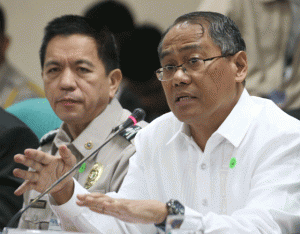BUREAU of Corrections Director Franklin Bucayu on Tuesday admitted that illegal drug trade still exists inside the New Bilibid Prison (NBP).
Testifying at the Senate Committee on justice and human rights hearing, Bucayu said while there are still incidents of drug trade at the NBP, the situation has improved after the transfer of 19 drug lord inmates to the National Bureau of Investigation.
Bucayu told senators that the drug trade and other problems at the NBP are the results of congestion, lack of personnel, poor structures and porous chain of command.
He said that one way of addressing these problems is to construct a new facility with enough space for the 22,000 prisoners.
The BuCor chief was referring to their proposal to build a 500-hectare prison facility in Laur, Nueva Ecija, which will be the new site of the NBP. The project will cost around P50 billion.
He added that the proposed prison facility will have enough structures to house the prisoners and enough number of personnel to guard them.
Sen. Aquilino Pimentel 3rd said that while he welcomes the proposal, the BuCor should make sure that the plan will involve all concerned agencies considering that it is a very expensive project.
The senator wants to make sure that the problems being faced by the NBP will be addressed with the construction of the new prison facility.
Pimentel said he is in favor of replacing the aging NBP in Muntinlupa City that was built in 1935 with a modern national penitentiary complex to address problems caused by congestion and sub-human conditions at the country’s premier penitentiary.
Based on BuCor records, the country’s seven penitentiaries have a total population of 40,185 inmates when they are only good for 16,000 inmates. This translates to a congestion rate of about 150 percent.
The Bilibid Prison, site of a recent scandal involving high-profile inmates, is more disconcerting, said Pimentel, because it has a congestion rate of 170 percent with a population of roughly 22,800 for a facility built for 8,400 inmates.
He said the inadequate and poor maintenance of penal facilities resulted in bloody fights and anarchy and the proliferation of criminal activities, while other prisoners live like kings in their air-conditioned special cells, called “kubols.”
Pimentel also noted the overlapping functions of various national agencies like the Departments of Justice, Interior and Local Government, Social Welfare and Development, and the different local government units charged with similar correction and rehabilitation functions.
Congress recently enacted Republic Act 10575, or the Bureau of Corrections Act of 2013, mandating the government to zealously promote the general welfare and safeguard the basic rights of every prisoner.


